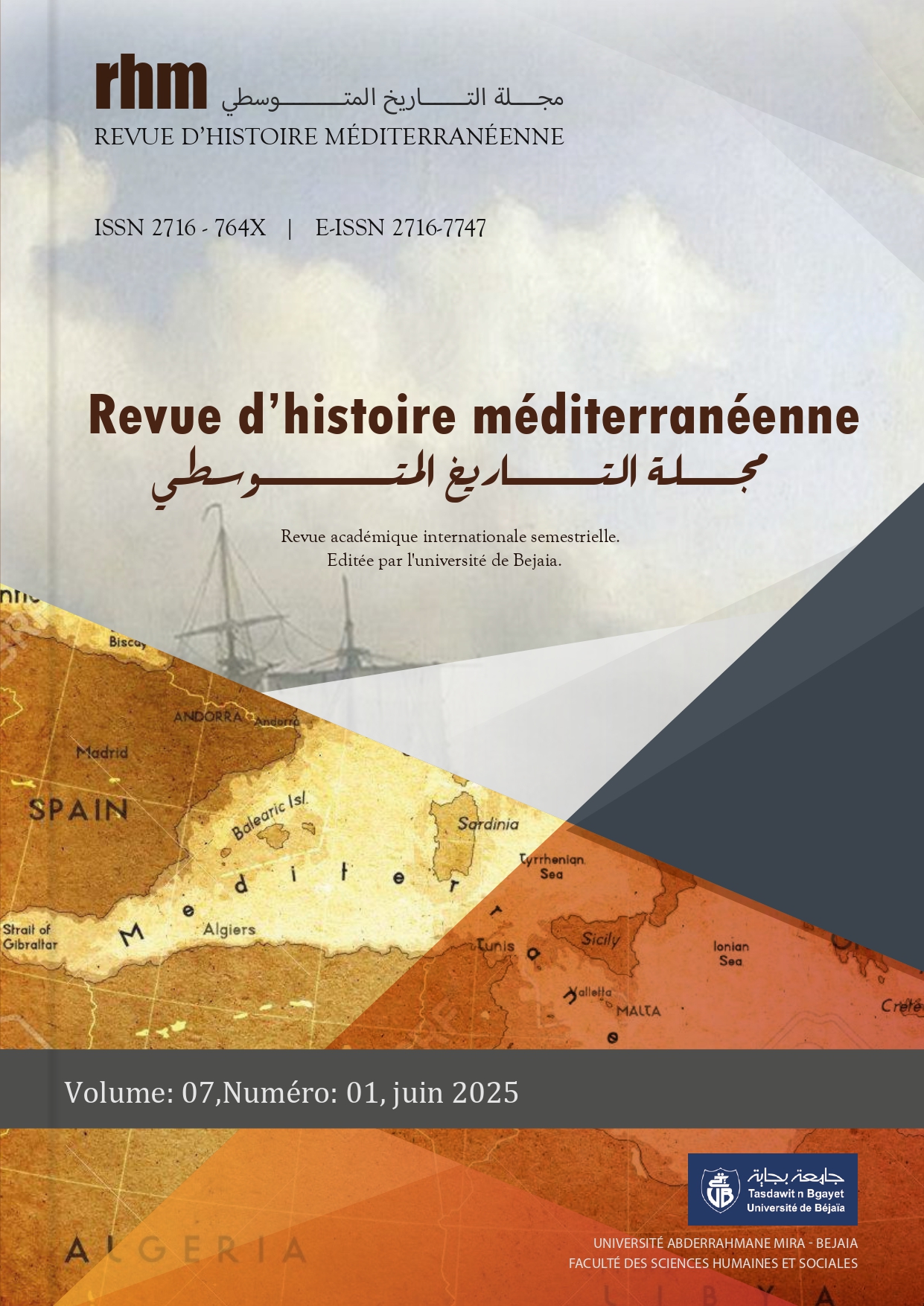أُكتاويوس بقلم مينوكيوس فليكس أحد رواد المنافحة عن المسيحية ما بين منتصف القرن الثاني ومنتصف القرن الثالث
Octavius by Minucius Félix, An Early Christian Apologist, between the Mid-Second and Mid-Third Century
Résumé
عرف المغرب القديم وبالأخص نوميديا في الفترة القديمة من تاريخها ظهور شخصيات فذَّة غيرت المسار التاريخي للمنطقة ضمن مجال اتسم بالصراعات الفكرية والسياسية والاجتماعية والدينية كان لها صدى كبير سواء على المستوى الجغرافي للمنطقة أو نطاق الحكم الروماني، في هذا البحث نهدف إلى تبيان وتحديد شخصية إفريقية لعبت دورا مهما في الصراع الديني والاضطهاد الروماني للديانة المسيحية، كديانة جديدة. وهذا الصِّراع وصل امتداده للإمبراطورية الرومانية الذي حرك كيانها في منطقة المغرب القديم، مما أدى إلى صراعات على الساحة الفكرية الدينية وهنا تعرفنا على شخصية "مينوكيوس فليكس" الإفريقي الأصل كواحد من أبرز الشخصيات و التي نود إظهاره من خلال إنجازه التاريخي، علما أنه لم يحظى بالأهمية الوافية رغم تأثيره من خلال موقفه في الدفاع عن المسيحية، ويعرف بـ مينوكيوس فيلكس الكيرتي نسبة لمسقط رأسه وهي مدينة كيرتا (قُسنطينة). كان يدافع عن المسيحية والمسيحيين في ممارسة ديانتهم الجديدة انتقالا من الوثنية سواء الرمانية أو المحلية، وتجسيد الأفكار الدينية التوحدية في بلادهم المغرب القديم. حيث عرفوا هؤلاء آنذاك اضطهادا غير مسبوق من قتل وتشريد، كان له أثرٌ كبيرٌ تاريخياً واجتماعياً في المنطقة، فجاءت هذه الشخصية الإفريقية لمواجهة هده المعضلة بأفكار جد مهمة، توحي وتوضح الصراعات وردود فعل الحكام الرومان في أوساط الطوائف الوثنية والمسيحية على مستوى الإمبراطورية الرومانية ومقاطعاتها. يطرح الموضوع إشكالية مساهمة مؤلَّف مينوكيوس فليكس في رصد الصراع الدّيني الوثني المسيحي خلال القرن الثالث ميلادي. والذي اعتمدنا في دراسته على المنهج التاريخي الوصفي التحليلي. حيت حاولنا أن نبيّن من خلال الدراسة التاريخية أن ماركوس مينوكيوس فليكس قد غيَّر معرفتنا من خلال نصّه التاريخي على وجه التحديد. وبالعودة إلى إستوغرافيا مؤَلَّفه، حاولنا َإظهار أهمية النص التاريخي لمينوكيوس فليكس مند العثور على المخطوط إلى غاية بروزه في طبعاته الحديثة، كمؤشر لدراسة فكر أحد الشخصيات الإفريقية المناهضة للحكم الروماني من جهة. ومن جهة أخرى إبداء رأي أحد الكتاب القدامى في قضية الدين والاضطهاد والوثنية كسلوك كان له أثر في انتشار المسيحية بالمغرب القديم. اعتمدنا في الدراسة على مادة مصدرية مهمة حسب رأينا وهي أساسا محددة في النص التاريخي الموسومة بـ " أُكتاويوس " كما عدنا إلى العديد من الدراسات الأخرى، أهمها دراسة بول مونصو في كتابه "التاريخ الأدبي الإفريقي المسيحي من بدايته إلى غاية الغزو العربي".، وكذلك دراسة جون بوجو "مينوكيوس فيلكس، أُكتاويوس" ففيها عرّف بـ مينوكيوس فليكس وناقش جُل الأطروحات حول الفترة التي عاش فيها مينوكيوس.
النص الذي بحوزتنا لمينوكوس فليكس تم تأليفه تحت مسمى " أُكتاويوس " في الفترة ما بين 220م و 249م وحتى 250م أي قبل 258م وهذه فترة حاسمة في ظهور المسيحية في منطقة المغرب حسب التقديرات التاريخية. إذن هذه الفترة محددة بعوامل تاريخية لانتشار المسيحية وهذا ما يساعد على إدراجها داخل الدراسات الأستوغرافية لتك المرحلة. مينوكيوس فليكس استعان في إنجازه لمؤلفه بأسلوب المحادثة والقصص التاريخي ضمن فضاء سوسيولوجي مغاربي محض ومحلي بالدرجة الأُولى وهذا ما يجعلنا نقر أن الشعوب القديمة بمنطقة المغرب حافظت على الأصالة في سرد الأحداث واستمرارية الأساليب المغاربية في تراثها إلى يومنا هذا وهو مجال خصب لمعرفة وفهم شعوب المغرب القديم فكريا وحضاريا عبر العصور بطريقة سلسة حيث تندرج ضمن الموروث الثقافي الأنثروبولوجي وهذه الخاصية حسب منظورنا لا يستهان بها في المعرفة التاريخية











